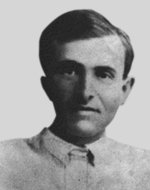Monter, Benjamin
Son of Baruch. Born in 1894 in Lodz to a religiously observant family, he learned from his father the work of watches and jewels and helped him in the large store and he learned a page of Gemara every evening. When he established a youth group in his area, a branch of “Tzeirei Zion” joined them, and he was also a member of the “Hovevei Sefat Ever” club, visited the plays and heard lectures, and as a member of the Kol evening group sang a lot in Hebrew and Yiddish. Very dedicated. On one of our trips I witnessed his courage. We met a group of people who were chasing a wild man who was waving a knife and threatening him with the whole battle. Immediately Benjamin jumped up and grabbed him by the hand holding the knife. I caught him by the other hand. . . In 1913, Binyamin and his friend set out for Palestine, sailing to Palestine from the port of Trieste on the ship “Helwan.” On the way, Binyamin fell ill and his illness continued for a whole year in Israel and prevented him from going to work. His parents sent him watch instruments and he began to do this work in Tel Aviv and Jaffa, refusing to accept his parents’ invitation to return to them, if only for the sake of recuperation: “The Land of Israel is a place of recovery for all of our people and I will be well here.” After the outbreak of the First World War and the Turkish authorities began to persecute the foreign subjects in Jaffa Tel Aviv, he moved to Petach Tikva where he founded the “Amal” group and began working in the orchards. He became one of the best workers in Rehovot, and in 1916 he came to the far-away town of Ruhama, where he also worked and also guarded. In the time of the great arrests by the Turkish authorities in Palestine he was arrested with the members of Ruchama and transferred to Jerusalem where he worked for a while and then joined an agricultural group in Metula in the Upper Galilee. With the worsening of the security situation of the northern communities in 1920, he moved to Tel Hai. In the great attack on the Tel Hai courtyard on the 11th of Adar (March 1, 1920), he was killed by a bomb that was thrown into the room. His name was immortalized in the book of Tel Hai, Yalkut and the Second Aliyah Book.
